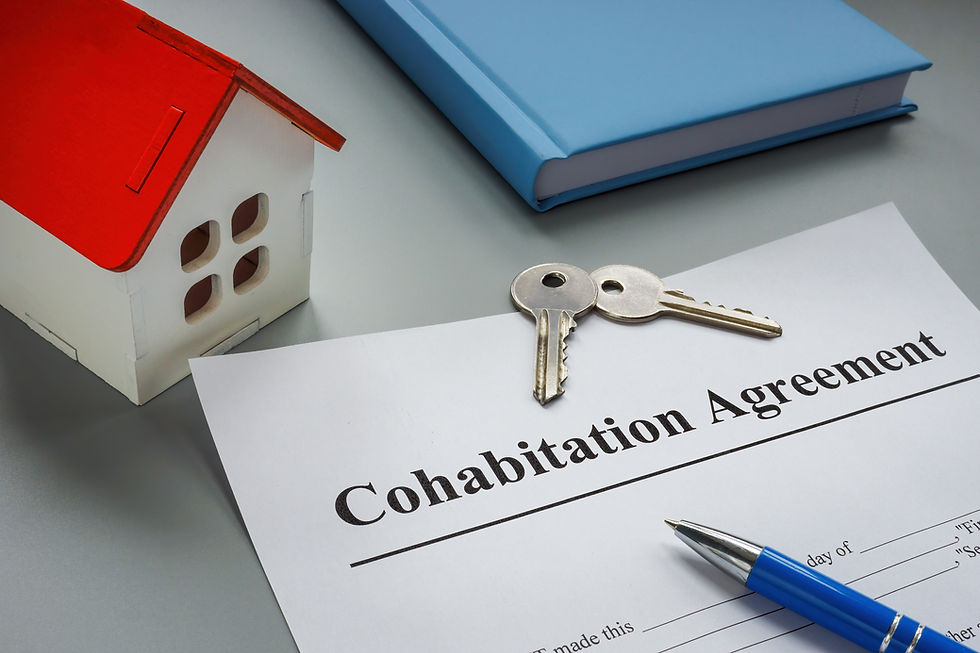The transfer of immovable property after a divorce
- Feb 3, 2022
- 4 min read
How is immovable property dealt with in a divorce?
An uncontested divorce will result in a consent paper being drawn up by a divorce attorney, signed by both parties, and the previously mentioned document becoming an order of court. Furthermore, if the divorce is contested, a magistrate or judge will make the final decision as to how, in accordance with the marital property regime and their antenuptial contract (ANC) (if applicable), the parties’ estate will be dissolved. Whether or not a divorce is contested, spouses will have to abide by the divorce order and the immovable property will be dissolved accordingly.
Co-operation is required from both parties for the transfer to be successful. If one party refuses to comply, the other party may bring an application to court compelling the counterpart to adhere to the divorce order. If a spouse is awarded the immovable property registered in the counterpart’s name, the spouse’s interest in the property is protected by his or her personal right acquired by the divorce order. The counterpart cannot sell the property and the property is protected from creditors until the deed of transfer is effected.
Immovable property can only be transferred from one person to another by virtue of registration of the transfer in the deeds office. The dissolution of a marriage after divorce does not automatically bring about the transfer of ownership of the property. It simply allows for the recipient spouse a claim to the transfer of the share of the previous spouse.
Upon registration, with a marriage in community of property, the Registrar will endorse the title deed to show that the previous spouse no longer holds an interest in the property and that the former’s rights to the property now vests with the recipient spouse, as though that spouse had taken formal transfer of the property from the previous spouse. Therefore, the spouse who received a full share of the property will make an application to the Registrar of Deeds to endorse the current title deed, displaying only him or her as being the sole owner.
The Deeds Registries Act does not provide a period within which the spouse acquiring the property is required to have the title deed endorsed to reflect the change in ownership. Until such time as the change in ownership is endorsed by the Registrar of Deeds, the title deed will continue to reflect both the former owner and the spouse acquiring the property, despite the marriage having been dissolved by a divorce order.
With a marriage out of community of property, the spouse who acquires the property will need to undergo a formal deeds office process and obtain a new title deed in his/her name.
The saying of “what’s mine is mine” comes into play. Upon dissolution of the marriage, this usually remains. Should accrual be included, a claim comes into existence regarding a share of the accrual (the accrual ensures that both spouses gain a fair share of the estate once the marriage ends).
But when property comes into play - and should the spouses be joint owners of a property, the property may be awarded to one party in terms of the divorce order and formal transfer of the half share of the property must take place from one spouse to the other. For this to take place a formal deeds office process must be followed to ensure that the spouse who acquired the property is reflected as the now sole owner.
Unlike endorsements in the case of a marriage in community of property, the process here can be compared to that of a sale of a property where ownership is transferred from a seller to a purchaser. An agreement of sale is the cause for the transfer of ownership from a seller to a purchaser. In the case of a divorce, the divorce order and settlement agreement is the cause for the transfer from your ex-spouse to yourself.
If, however, you decide that you no longer want the property and you would rather sell the property, this can be done by an amended agreement to the settlement agreement entered between your ex-spouse and yourself. If the parties wish to amend a settlement agreement that has already been made an order of court, they will need to formally apply to court to now make the amended agreement an order of court. This is only possible if you have not yet taken formal transfer of the property.
The agreement to amend the settlement will need to be lodged in the deeds office as a supporting document. Both you and your ex-spouse will have to sign the offer to purchase as well as all the transfer documents relating to the sale of the property because the title deed and the deeds office records will still reflect that you and your ex-spouse are the joint registered owners.
However, for property that is owned by only one party, especially prior to the commencement of the marriage, the divorce proceedings will not have any effect on the property ownership. Individually owned property will remain the property of that one spouse.
Is Transfer Duty payable?
In terms of Section 9(1) (i) of the Transfer Duty Act 40 of 1949, transfer duty does not apply if a property is awarded to a spouse in terms of a divorce order. The exemption applies to all marital regimes and to civil unions. However, if the property is not awarded to a spouse in terms of a divorce order and the parties reach an agreement outside of the formal divorce proceedings, the spouse who acquires the property will be liable for transfer duty.
Despite the parties being exempt from paying transfer duty, the Divorce Order sets out who is liable to pay the costs of transfer of the property, it is usually the party who acquires the property in a Divorce Order who will be liable to pay all costs related to the transfer costs (if applicable) and costs due in obtaining all the required compliance certificates.
Conclusively, divorce is an emotional and challenging time for all parties concerned. The consequences of dealing with immovable property can be more pervasive than the parties initially anticipated. It is best to cater in detail for the disposal and splitting of the parties’ assets by agreement at the time of divorce. If the parties are already divorced the parties and agents should ensure that they proceed on the correct basis to prevent wasted efforts, unnecessary disputes, and delays.
.png)



Comments